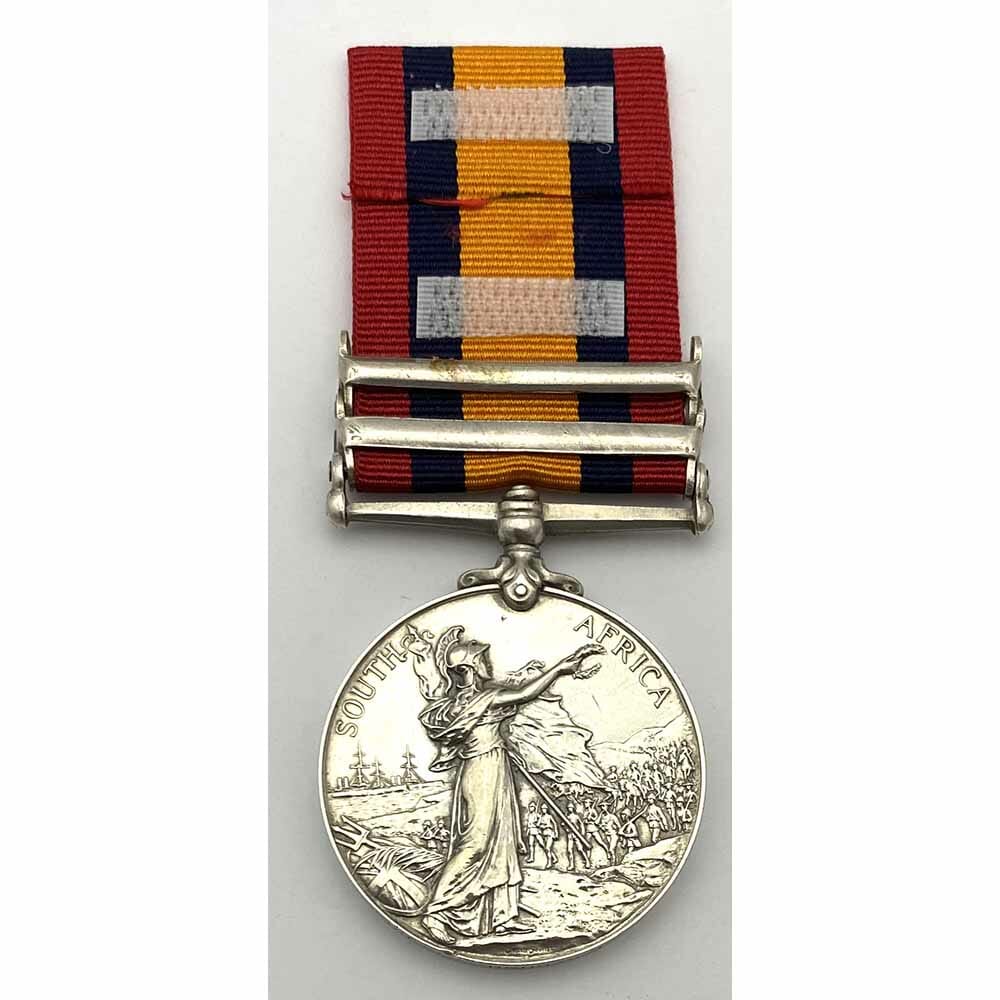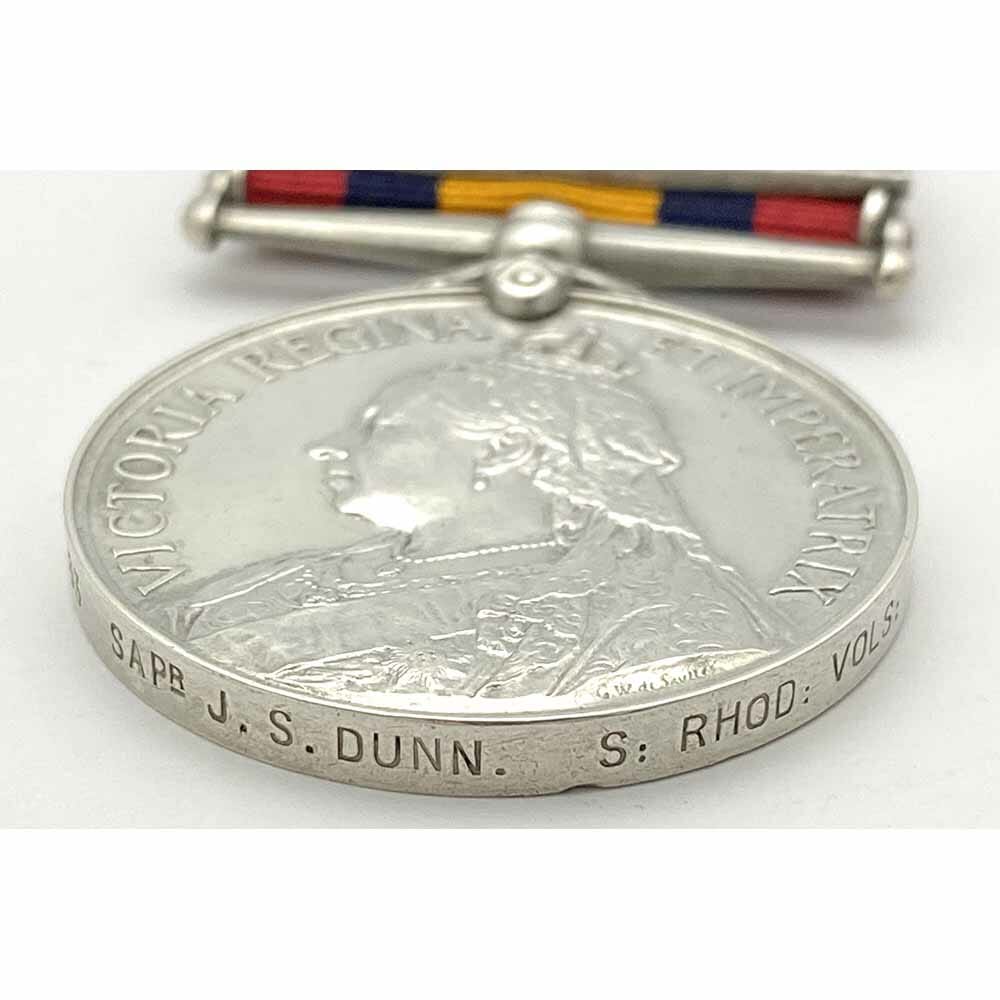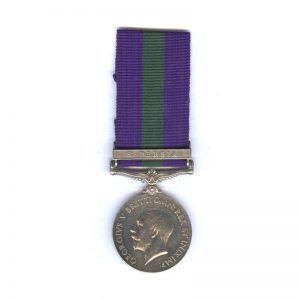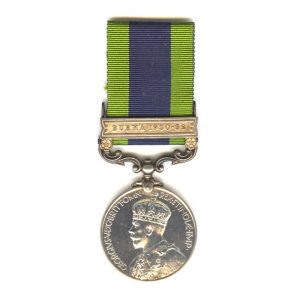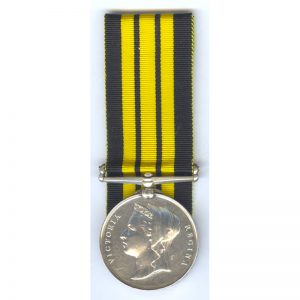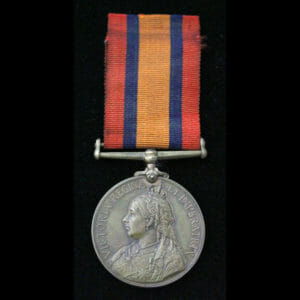Description
Queen’s South Africa Medal, 2 bars, Rhodesia, Relief of Mafeking, 163 Sapper James Stephen Dunn, D Troop Southern Rhodesia Volunteers, a former Londoner turned South African.
A scarce and sought after entitlement of bars to the Southern Rhodesia Volunteers.
Officially impressed: “163 Sapr J. S. Dunn. S: Rhod: Vols:” Confirmed on the roll as full entitlement.
James Stephen Dunn, grew up in Hackney, London, having trained as an Architect he later became a Sanitary Inspector, in his 20s he travelled to South Africa and fought in the Boer War, following which he made the Town of Kimberley his new home, the perfect project for a Sanitary Inspector, he spent the next 40 or more years working to improve the town, writing the Annual Report home to the Sanitary institute of Great Britain for many of them, he was constantly sending letters overseas having read in the Journal of the Sanitary Institute and various publications of Municipal Affairs inquiring how they did things to bring the ideas back to Kimberley.
James Stephen Dunn, was born on 28th February 1872 in Hackney, London. The son of Stephen and Mary Ann Dunn, a Printer Reader, James was part of a large family living on Albert Road in Hackney.
By the 1891 Census he was a 19 year old Architects Pupil.
Whilst working as an Architect he was invited to join the Hiram Lodge of the Freemasons on 22nd May 1893.
By 1896 he was shown now as a Sanitary Inspector in Poplar, N. Division in the 1896 Edition of the London Manual, which would lead him to South Africa and becoming resident Sanitary Inspector for the rest of his life.
The Sanitary Record and the Journal of Sanitary and Municipal Engineering Volume 27, first shows Dunn summoning a Poplar Butcher, whom he caught offering meat in an unsound condition for human consumption, it then records his trip abroad, where he would combine his Architecture Experience with his new job in designing a Main Drainage system for Cape Town:
Page 848: “CAPE TOWN – Mr Dunn, Sanitary Inspector for the North District of the Poplar Board of Works, has been appointed to assist the engineer of the Corporation in the construction of a main drainage system for the city.
In 1902 he was the Sanitary Inspector of the Borough of Kimberley, compiling the annual report in the Sanitary Institute of Great Britain.
He remained in Kimberley for many years it seems, by 1913 he was the Chief Sanitary Inspector for Kimberley and was very active in the post war years in fixing any health and sanitary issued in the town.
He had some published theories in Health Journals, including his idea for disposable Papier Mache milk bottles which would allow guaranteed sanitary milk vessels, mentioned in the American Journal of Publish Health, taken from “The Medical Officer, 4th October 1913:
“The hygiene advantages of Papier Mache milk vessels are strongly urged in a note by Mr James S. Dunn, Chief Sanitary Inspector for Kimberley, contributed to the ‘Official Municipal Yearbook of South Africa.’
Mr Dunn writes: ‘Paper bottles have everything in their favour. They are filled at the farm while the milk is fresh and before contamination from the many extraneous sources. They are only used once and ever refilled.
Each purchaser is, therefore, assured of an original bottle of clean, wholesome milk providing all the precautions, applicable to the proper production of milk have been complied with.
The dealer also profits. He pays freight on the original carriage only and is relieved from the necessity of returning the empties.’
Mr Dunn adds at the collection of bottles, return freight on the empties, breakage and bottles lost through various reasons, constitute a big item, while the cost of new paper bottles is very small in comparison.”
In 1912 he had written to Pittsburgh, asking for advice, noted in the Pittsburgh Daily Post, Pennsylvania, 13th Feb 1912:
“WRITES FROM AFRICA FOR ADVICE – Yesterday morning Health Director E. R. Walters received a letter from James Dunn, Borough Sanitary Inspector of Kimberley, South Africa, asking for copies of the report of the health department’s work here. He also asks advice and suggestions.”
Still active in 1934, a letter post card was sent all the way to Montclair, New Jersey, where he had made an inquiry on their methods:
The Montclair Times, New Jersey, 6th March 1934:
“SOUTH AFRICA TOWN WRITES TO MONTCLAIR, Kimberley Sanitary Inspector Asks Refuse Collection Data.
Montclair’s fame in municipal affairs is widespread, extending beyond the confines of the Unites States. The other day, Town Clerk Joseph D. McKee received the following post card from J. S. Dunn, Sanitary Inspector of Kimberley, South Africa, South Africa:
‘As I understand ashes, rubbish and garbage are removed separately in your town, I shall be pleased if you will kindly let me have some particulars in connection with such works as a similar idea is being put forward for adoption in this city.’
Mr McKee replied that separate collections were made under municipal operation but had been abandoned when the work was let to private contractors.”
He died at the age of 89 on 13th December 1961, he was living at 19 Dalham Road in Kimberley, Cape Province. He is buried in Kimberley West End Cemetery.

